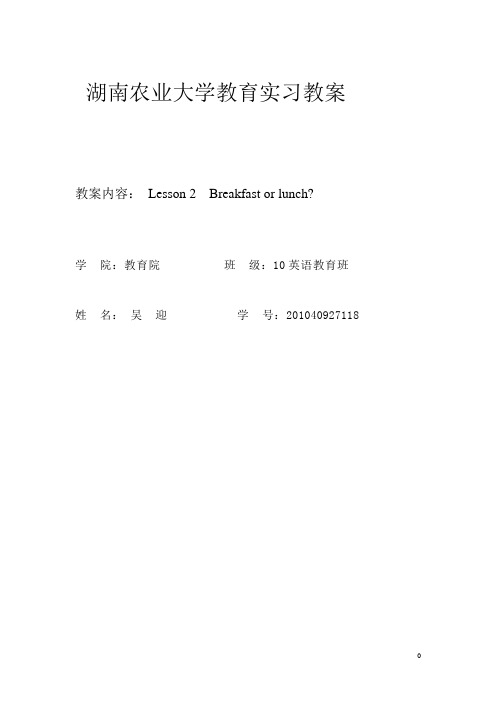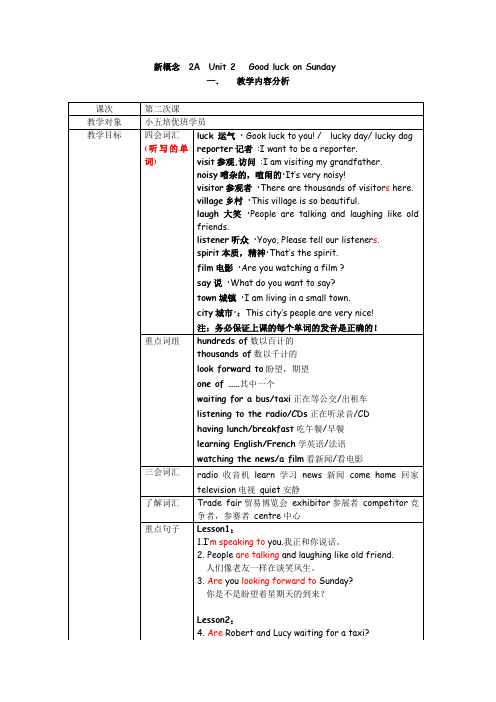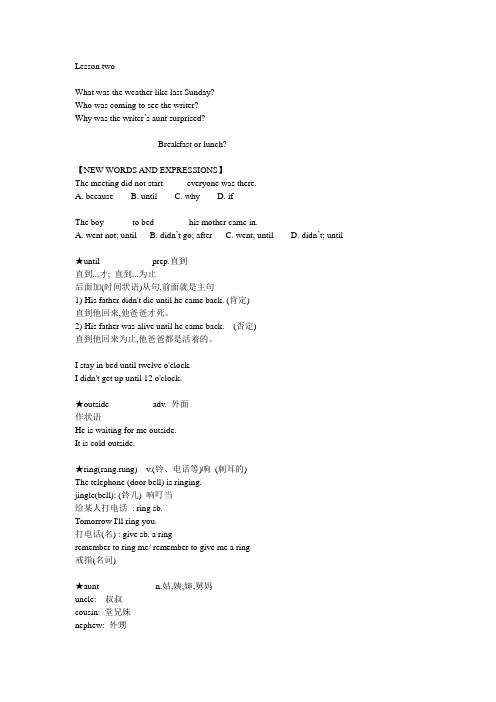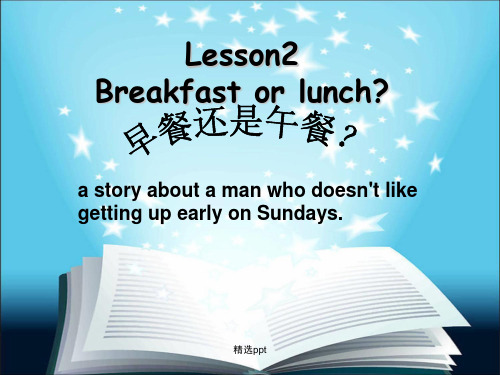新概念英语教案-第二册第二课-完美版
新概念英语第二册-第二课

'I'm having breakfast,' I repeated. ‘___D__e_a_r _m_e____,' she said. 'Do you always get up __so__late? It's one o'clock!'
新概念英语第二册-第二课
10. Dear me! ☆天哪!表惊讶。 还可以说:M__y_g_o_o_d_n_e_s_s_!; __G_o_o_d__H_e_a_v_e_n_s!_____; __M__y_d_e_a_r_!____; ___M_y__g_o_d_!________
新概念英语第二册-第二课
翻译下列句子: 你很快就要离开吗?_A_r_e_y_o_u__le_a_v_in_g__s_o_o_n_?______ 他今晚要去剧院看戏。 _H_e_’s__g_o_in_g_t_o_t_h_e_t_h_e_a_tr_e__th_is__e_v_e_n_in_g_.________ 将要在5分钟后到达。 _T_h_e__tr_a_in__is__a_rr_iv_i_n_g_in__5_m__in_u_t_e_s.
v. (铃、电话等)响起
aunt [ɑ:nt] n.
n. 姑,姨,婶,舅母
repeat [riˈpi:t] v.
v. 重复
新概念英语第二册-第二课
B.The text: Breakfast or Lunch
新概念英语第二册-第二课
新概念第二册第2课课件

It was Sunday. it指时间、天气、温度或距离,被称为“虚主语”。 作为第三人称单数的中性代词,it可以指一件东西、一件事件或用来指是什么人: 从公司到我家大概有5公里。 It is about 5 kilometer from the company to my home. 这是个可爱的小婴儿。 It is a lovely baby.
课文讲解
It was Sunday. I never get up early on Sundays. I sometimes stay in bed until lunchtime. Last Sunday I got up very late. I looked out of the window. It was dark outside. 'What a day!' I thought. 'It's raining again.' Just then, the telephone rang. It was my aunt Lucy. 'I've just arrived by train,' she said. 'I'm coming to see you.' 'But I'm still having breakfast,' I said. 'What are you doing?' she asked. 'I'm having breakfast,' I repeated. 'Dear me,' she said. 'Do you always get up so late? It's one o'clock!'
新概念英语教案第二册第二课完美版

Lesson 2 - Breakfast or lunchTextIt was Sunday.I never get up early on Sundays.I sometimes stay in bed until st Sunday,I got up very late.I looked out of the window.It was dark outside."What a day!"I thought.It's raining again.Just then,the telephone rang.It was my aunt Lucy."I've just arrived by train."she said."I'm coming to see you.""But I'm still having breakfast."I said."What are you doing"She asked."I'm having breakfast."I repeated."Dear me!"She said."Do you always get up so lateIt's one o'clock."New words and expressions 生词与短语until prep. 直到outside adv. 外面ring v. (铃、等)响aunt n. 姑,姨,婶,舅母repeat v. 重复Note on the text 课文注释1 on Sundays, 指每个星期日。
星期几的前面用介词on。
2 What a day! 多么糟糕的天气!这是一个省略的感慨句。
完好的句子应当是What a day it is!英语中的感慨句常用what 开头,后面紧跟一个名词或名词性短语(包括连系动词),然后是主语与谓语,句尾用感慨号。
新概念英语第二册第二课教案

湖南农业大学教育实习教案教案内容:Lesson 2 Breakfast or lunch?学院:教育院班级:10英语教育班姓名:吴迎学号:201040927118Lesson 2 Breakfast or lunch?Teaching Aims and demands:1.Review the usage of Special Question.2.Master the usage of present continuous , and the word ―what‖.3.Grasp the following words and phrases:until, outside, ring, aunt, repeat, get up , stay, look out of, what a day, just then, by train, have breakfast,dear me.4.Learn a kind of word formation by adding affix —affixation5. Practice oral English with the topic ―A great breakfast I have at primary school/university‖.Teaching Content: Text ; Exercises (from Vocabulary to Writing)Teaching Key points and difficult points:1.the usage of present continuous.2.until, ring, repeat, get up, stay, look out of, just then, dear me.Teaching Periods: 6 periodsTeaching Procedures:Period 1-2:Ⅰ. Introduction to the text by asking some questions.Questions:1.Is it hard for you to get up early?2.Do you usually stay in bed very late?3.What time do you get up everyday?4.Do you usually have breakfast in lunchtime? Why?5.Do you remember your last brunch in school?6.Do you think it’s good for your health to have breakfast in lunchtime? Why?7.How do you usually make yourself have breakfast at the right time?8.Can you be an early bird for a month? ―Yes‖ or ― No‖?Ⅱ.Ask students to go through the text and finish the pre-class work to get the main idea of the text. Then analyze the text the general idea .Ⅲ. Explain the text in details.1. until prep. : up to the point in time or the event mentioned.e.g: Until she spoke I hadn’t realized she wasn’t English.You can stay on the bus until London (=until you reach London.)*from morning ~night.※ till (informal)1) conj./prep =untile.g. :Can’t you wait till we get home?2) n. the place were you pay for goods in a large shop/store.*a long queue at the tille.g. :Please pay at the till.3) v. (old use) to prepare and use land for growing crops.Usage Note:Till is generally felt to be more informal than until and is used much less often in writing. At the beginning of a sentence, until is usually used.2.outside1). adv. not in a room,building or container but on or to the outside of it. 在外面,向外面e.g. I’m seeing a patient ---please wait outside.It’s warm enough to eat outside.2) n. The outer side or surface of sth 外部e.g. I didn’t go into the temple---I only saw it from the outside.* At the ~ = at the moment = as a maximum* on the ~ :①Used to describe how sb appears or seemsOn the outside she seems calm, but I know she’s worried.②Not in prionLife on the outside took some getting used to again.3) adj./prep.She has a lot of outside interests (= not connected with her work)They fell cut off from the outside world.(=from other people and from other things that were happening) ~ chance of winning 胜算极小~of = apart frome.g. There was nothing they could do, outside of hoping things would get better.3.ring1) v. (rang, rung)~ sb. upI’ll ring you up later.~ sth. upShe rang up all the items on the till.~ for sth.Could you ring for a cab.~ (with sth.): to be full of a sound. 回想Applause rang through the hall.~ offHe rang off before I could explain.2) n.①give sb a ~: to make a telephone call to sb.E.g. I’ll give you a ring tomorrow.have a ~ of truth 真实可信E.g. His explanation has a ring of truth about it.②circleA key ~E.g. The children sat on the floor in a ring.③JewelleryE.g. A diamond glittered on her ring finger.4 .aunt : the sister of your father or mother; the wife of your uncle.E.g. My aunt lives in Canada.Auntie (= aunty ):Auntie Mary.5.repeat v.1) say/write again.To ~ a question.Do say if I’m repeating myself (=if I have already said this).He’s fond of repeating that the company’s success is all down to him.2) do againThey are hoping to repeat last year’s victory.To ~the class /year/grade(=in a school, to take the class/ year /grade again)重修这门课;重读一年;留级3)happen againHistory has a strange way of repeating itself.Repeatable adj. (usually in negative sentences)Repeated adj. (happening, said or done many times)~ absences from work.Repeatedly adv.E.g. The victim had been stabbed repeatedly in the chest.6 . get up: to stand up after sitting, lying, ect. ; to get out of bed.E.g. The class got up when the teacher came in.Could you get me up at 6:30 tomorrow.7.Stay1) stay in : to not go out or to remain indoorsE.g. I feel like staying in tonight.2)stay up : to go to bed later than usual.E.g. You’ve got school tomorrow. I don’t want you staying up late.3) stay away (from sb /sth): to not go near a particular person or place.E.g. I want you to stay away from my daughter.8.lookE.g. The teacher told us to look at the blackboard.That looks like an interesting film.Glance: take a quick look.E.g. She glanced at her watch during the talk.Gaze :a long steady look at sb/sth.E.g. She felt embarrassed under his steady gaze.Glare : a long angry look at sb/sth.E.g. The old woman glared at him9.Just then: at the momentE.g. Just then, someone knocked at the front door.Just then, my girlfriend drove up and gave me a ride.10.Dear me: used in expression that show that you are surprised, upset, annoyed or worried.E.g. Dear me! What a mess!Dear oh dear! What are you going to do now?11.What a day! =what a day it is ! =>elliptical sentenceE.g. This is a beautiful picture.= What a beautiful picture.She is careless. = How careless she is.12.I’m comeing to see you.Be +Ving +to : used to show that sth is likely to happen very soon or in the future.E.g. I think I’m going to faint.Look at these black clouds--- it is going to rain.15. Word formation-----affixationAdv. –ly(the suffix –ly ,from Middle English, is added to adjectives to form adverbs.)adj. Adv.repeated repeatedlylate latelyPeriod 3-4Ⅳ. Do some oral practice.1.Ask students to retell the story based on the following questions by using theexpressions in the text.Questions concerned:a. Does the writer always get up early on Sunday, or does he always get up late?b.Did he get up early last Sunday, or did he get up late?c.Who telephoned then?d. Had she just arrived by train, or had she come on foot?e.Did he say,’ I’m still having breakfast’, or did he say ,’ I am still in bed’?f.Was his aunt very surprised or not?g.What was the time?2.Topic: A great breakfast I have at primary school/universityExpressions for reference:(great,campus, delicious, roommates, cheap, etc.)(unforgettable, amusing, surprised, various, etc.)Ⅴ. WritingAsk students to write a summary about this text in not more than 55 words.Ⅵ. ConclusionAsk some students to read their summaries and evaluate the best one. Analyze the reasons why his/hers is the excellent.(talk about the skills)Period 5-6Ⅶ. Do some exercises in class and check the answers.1. When Aunt Lucy telephoned _____.A.the writer was asleep.B. the writer was still in bed.C. the writer had already got up.D. the writer was having lunch.2. Aunt Lucy was surprised because_____.A. the writer was having lunch.B. it was one o’clock.C. it was late.D.the writer was having breakfast at lunchtime.3. Write these sentences again. Each sentences must begin with what.a. This is a wonderful garden!b. This is a surprise!c. He is causing a lot of trouble.d. They are wonderful actors!e. She is a hare-working woman.f. You are a clever boy.4. Give the correct form of the words in parentheses.a. he is still _______(sleep).b. It (begin) to rain before she took a taxi.c. When all the guests had left, Derek (arrive).Ⅷ.Assignments :1. Structure& V ocabulary : P192. Writing: An unforgotten day in school.。
新概念英语2A L2教案)青少版新概念2A教案--Unit2

新概念2A Unit 2 Good luck on Sunday一.教学内容分析—Yes,they are./No, they aren’t.5. Who are waiting for a taxi? 谁正在等出租车?—Robert and Lucy (are).6. What are they waiting for?他们正在等什么?—(They’re waiting for) a taxi.7.What are Robert and Lucy doing?Robert和Lucy正在做什么?—They’re/They are waiting for a bus.他们正在等公共汽车。
注:本副课主要讲授并练习第一人称复数和第三人称复数的现在进行时,特殊疑问句及其回答。
语音教学/ai/ apply buy cry deny die fly lie reply/ai-iŋ/ applying buying crying denying dyingflying lying replying相关语法 1.现在进行时的用法。
注:本次课的第一个语法在第一次课已有一个初步的认识,这次课主要是先复习再进行具体的讲解及巩固。
现在进行时:表示现阶段已正在进行或发生的事2.反问疑问句句型。
注:本次课的这个语法是五年级第一次接触到,所以一定要简而明的讲授。
难点:1. 反义疑问句:表示提问者对某事有一定主见,但是没有把握,希望对方来证实。
2. 结构:前面是肯定陈述句,后面加省略问句的否定式。
【重点提示】1.前肯,后否;前否,后肯。
2.回答,不管问题的提法如何,若事实是肯定的,就用yes回答,事实是否定的,就用no回答。
注意中文翻译.教学辅助手段粘球课文视频PPT 音标操教学用具课堂奖励机制小组pk ,个人扔筛子加分,打比赛加分,抽奖加分二.课堂教学过程(第一节课)时间教学步骤备注A: What are they doing?B: They are waiting for a bus.2.学生口头回答课文P16 Guided Summary练习题并校对。
新概念第二册第2课精品PPT课件

•
‘What are you doing?' she asked.
•
‘I'm having breakfast,' I repeated.
•
‘Dear me,' she said. ‘Do you always get up
so late? It's one o'clock!'
•
New words and expressions 生词和短语
• It was Sunday. I never get up early on
Sundays. I sometimes stay in bed until lunch
time. Last Sunday I got up very late. I looked
out of the window. It was dark outside. ‘What a day!' I thought.‘It's raining again.'
Just then, the telephone rang. It was my aunt Lucy. ‘I've just arrived by train,' she said. ‘I'm coming to see you.'
•
‘But I'm still having breakfast,' I said.
• aunt /a:nt/
n. 姑母,姨母,阿姨,伯母,舅母,舅妈 uncle 叔叔,伯伯,伯父
• repeat /ri'pi:t/
n. 重复 v.重复 Jenny's blood test was repeated three times. He repeated several times that he was busy. Today's lecture was an exact repeat of yesterday's.
新概念英语第二册第二课最全讲义

Lesson twoWhat was the weather like last Sunday?Who was coming to see the writer?Why was the writer’s aunt surprised?Breakfast or lunch?【NEW WORDS AND EXPRESSIONS】The meeting did not start_____ everyone was there.A. becauseB. untilC. whyD. ifThe boy______ to bed _______ his mother came in.A. went not; untilB. didn’t go; afterC. went; untilD. didn’t; until★until prep.直到直到...才; 直到...为止后面加(时间状语)从句,前面就是主句1) His father didn't die until he came back. (肯定)直到他回来,他爸爸才死。
2) His father was alive until he came back. (否定)直到他回来为止,他爸爸都是活着的。
I stay in bed until twelve o'clock.I didn't get up until 12 o'clock.★outside adv. 外面作状语He is waiting for me outside.It is cold outside.★ring(rang.rung) v.(铃、电话等)响(刺耳的)The telephone (door bell) is ringing.jingle(bell): (铃儿) 响叮当给某人打电话: ring sb.Tomorrow I'll ring you.打电话(名) : give sb. a ringremember to ring me/ remember to give me a ring戒指(名词)★aunt n.姑,姨,婶,舅妈uncle: 叔叔cousin: 堂兄妹nephew: 外甥niece: 外甥女★repeat v.重复【TEXT】It was Sunday. I never get up early on Sundays. I sometimes stay in bed until lunchtime. Last Sunday I got up very late. I looked out of the window. It was dark outside. 'What a day!' I thought. 'It's raining again.' Just then, the telephone rang. It was my aunt Lucy. 'I've just arrived by train,' she said. 'I'm coming to see you.''But I'm still having breakfast,' I said.'What are you doing?' she asked.'I'm having breakfast,' I repeated.'Dear me,' she said. 'Do you always get up so late? It's one o'clock!'New words and expressions 生词和短语until prep. 直到outside adv. 外面ring v. (铃、电话等)响aunt n. 姑,姨,婶,舅母repeat v. 重复【课文讲解】On Sundays: 所有的星期天,每逢星期天never: 从来不(可以直接用在动词前面)=not (变成否定句,前面一定要加助动词)I don't like her.=I never like her.因为是上个星期,所以时态不是一般现在时。
新概念英语第二册Lesson2完整ppt课件

• I am working as a teacher now. tea?
• Don't you think you eat too much? You're putting on weight.
ring(rang,rung) v.(铃、电话等)响 [注]这种响是刺耳的,往往是提醒人做某事 如:The telephone/door bell is ringing. 而风铃等响要用jingle jingle(bell):(铃儿)响叮当
v.给某人打电话:ring sb n.打电话:give sb a ring Remember to ring me.=Remember to give me a ring. n.戒指
精选ppt
until • 用于表示动作,状态等的持续,后面加(时间状语)从句
或者表示时间的名词 • "一直到... ...为止" , "在... ...以前" 1、在肯定句中: 与表示持续性状态的动词连用,表示持续 到某一时刻
现在不是好时机,我还是等等,直到价格下来一点再说。
It’s not a good time now. I shall wait until the price comes down a little bit.
They will be here on Tuesday(morning /afternoon). I was born on July 1st. We’ll see you on Christmas Eve.
精选ppt
in,on,at 的用法
• in 时间范围较广,表示某年,某季节,某月,某周,某 一天的某段时间
- 1、下载文档前请自行甄别文档内容的完整性,平台不提供额外的编辑、内容补充、找答案等附加服务。
- 2、"仅部分预览"的文档,不可在线预览部分如存在完整性等问题,可反馈申请退款(可完整预览的文档不适用该条件!)。
- 3、如文档侵犯您的权益,请联系客服反馈,我们会尽快为您处理(人工客服工作时间:9:00-18:30)。
【前10分钟】检查笔记、检查作业、听写单词。
10’Lesson 2 - Breakfast or lunch?一、教学重点1、代词:it 做虚主语时的用法。
2、时态:一般现在时VS 现在进行时。
3、副词:频率副词的排序和位置。
二、教学步骤【第一节课】1、引入话题(详见右框)。
2’2、听一遍音频,掌握大意。
2’① What was the weather like last Sunday?② Who was coming to see the writer?③ What time was it then?3、生词解读,纠正发音(详见课本)。
4’4、提问:Why was the writer ’s aunt surprised?看一遍视频,解答问题。
2’5、精讲课文,板书和笔记(详见下文)。
30’【第二节课】1、文化背景。
3’2、再听一遍音频,逐句跟读。
3’3、做19页的两道选择理解题(详见课本)。
4’4、检查朗读,一起朗读。
10’51627、辨析一般现在时和现在进行时(详见下文)。
7’8、做17页的关于时态的练习题(详见课本)。
15’9、读绕口令游戏。
5’【第三节课】1521810 3、听写单词,记忆法指点。
5’ 4、听一首英文歌曲。
7’5、背课文、讲故事比赛。
20’6、总结本课重点,让学生标注(详见上文)。
2’7、布置作业:摘要写作,19页的选择题,背课文和单词。
1’ 三、精讲课文1、It was Sunday. 这里的it 是虚主语,可以指代时间、天气、温度、距离等多种事物,也可以指代某个不确定的人。
接下来课文中还会出现很多个it ,让我们来一起看看它到底指代什么。
2、I never get up on Sundays. 这是在说我一直以来的习惯,所以用了一般现在时。
never 从来不、绝对不。
频率副词,可以用在多种时态中。
例句:-Have you loved me? -Never. -Will you marry me? -Never. 太绝情了! on Sundays 在每一个星期天。
on用在具体的某一天之前,例如on March 21st ,on Monday ,on Monday morning在这里Sundays用了复数,表示在每一个星期天。
3、I sometimes stay in bed until lunchtime. 这句话也是一般现在时,表示习惯。
sometimes 有时。
频率副词。
常用于一般现在时。
例句:I usually get up at seven but sometimes at eight.stay in bed 待在床上不起来。
这恐怕是每个人的梦想吧,“赖床”。
stay是个持续性动词。
in bed 在床上睡觉VS 仅仅是陷在床里面in the beduntil和till的区别:till只用在肯定句中,until可以用在肯定句或否定句中。
until 用在肯定句中,表示一个动作一直持续到某时。
He stayed in bed until/till lunchtime.用在否定句中,表示直到什么时间才做了某事。
He didn’t get up until lunchtime.例句:Last night I stayed up until/till 12:00. = Last night I didn’t go to bed until 12:00.搞笑:梁朝伟在《韩城攻略》里的台词:TTTTT=Till They Tell The Truth。
lunchtime 午饭时间,一般是指11:00~13:00。
4、look out 小心,注意。
Look out! There’s a hole in the ground. = Watch out!look out of... 往…的外面看。
←→look into... 往…的里面看。
【笑话】5、It was dark outside. 这里的it也是虚主语,指代天色。
outside是地点副词,作状语。
6、What a day! 省略式感叹句。
= What a day it is! = What a bad/terrible day it is!来源:It is a bad day.→What a bad day it is!构成:What + 名词(包括冠词和形容词) + 主语代词+ 谓语动词+ !对照:How + 形容词/副词+ 主语(名词/代词) + 谓语动词+ !7、thought是think的过去式。
8、It’s raining again. 这里的it也是虚主语,代指天气。
again反映了作者抱怨的情绪。
因为是放在引号里的直接引语,所以用了现在进行时be + doing。
9、Just then, the telephone rang.then 然后,那时。
just 就,仅仅。
Just do it! 是NIKE的宣传口号。
just then = at that moment 就在那时ring [vi.] 不及物动词。
The bell rings. The phone rang.ring [vt.] 及物动词。
ring sb. = call sb.10、It was my aunt. 这里的it也是虚主语,代指某个不确定的人。
打电话或敲门时。
例句:-Who’s that? -It’s me, Rita. 【Action:Knock, knock!】不知人的性别时。
例句:-Who’s that baby? -It’s my sister, Alice.Aunt Lucy 称谓可以用在名字的前面。
举例:Uncle Tom,汤姆大叔的小屋。
11、I’ve just arrived by train. 这里的just是刚刚的意思,用于完成时。
例句:-Have you finished your homework? -I have just finished it.by +具体的交通工具:by bus/bike/ship/air/plane.... ;on foot12、I’m coming to see you. 用现在进行时表将来,表示即将、马上发生的事。
可用于这种情况的词:go,leave,arrive,die等。
例句:I’m leaving now. I’m dying. The train is arriving in five minutes.13、I’m still having my breakfast. 这里的still跟till长得很像,所以still是还、仍然的意思。
吃饭:have breakfast/lunch/supper/dinner/a meal14、What are you doing? 非常常用的一句话。
【Action】-Hey, what are you doing here? -I’m reading a book.15、repeat 重复。
re-是一个前缀,表示“重来,再次”。
例词:recovery 复原;remix 再混合,如歌曲的混音版;remind 再次想起16、Dear me! 这也是一个感叹句。
= Oh, my God! = My dear! = Goodness! = Good heavens!17、always 一直,总是。
频率副词。
常用于一般现在时。
18、so late 在这里so是个副词,修饰形容词late。
举例:so beautiful,so much,so clever19、It’s one o’clock! 这里的it也是虚主语,代指时间。
one o’clock可以连读。
四、总结与练习1、文化背景:早餐breakfast,午餐lunch,早午餐brunch,下午茶afternoon tea。
英国人的早餐很丰富:sausage, egg, bacon, toast, soybean, orange juice/coffee/tea...早起的鸟儿有虫吃:The early bird catches the worm. (早起的虫儿被鸟吃!)※顺便复习一下动词的五种形式及其变化规则:3、总结频率副词的排序和位置:位置:一般放在实义动词(谓语动词)之前,非实义动词(be动词、助动词、情态动词)之后,疑问句中一般放在主语之后。
4、18页关于感叹句的练习答案:(1) What a wonderful garden (this is)! (2) What a surprise (this is)!(3) What a lot of trouble he is causing! (4) What wonderful actors (they are)!(5) What a hard-working woman (she is)! (6) What a tall building (it is)!(7) What a terrible film (it is)! (8) What a clever boy (you are)!(9) What a pretty girl (she is)! (10) What a strange guy (he is)!。
